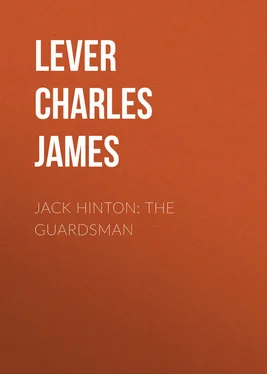Charles Lever - Jack Hinton - The Guardsman
Здесь есть возможность читать онлайн «Charles Lever - Jack Hinton - The Guardsman» — ознакомительный отрывок электронной книги совершенно бесплатно, а после прочтения отрывка купить полную версию. В некоторых случаях можно слушать аудио, скачать через торрент в формате fb2 и присутствует краткое содержание. Жанр: literature_19, foreign_antique, foreign_prose, на английском языке. Описание произведения, (предисловие) а так же отзывы посетителей доступны на портале библиотеки ЛибКат.
- Название:Jack Hinton: The Guardsman
- Автор:
- Жанр:
- Год:неизвестен
- ISBN:нет данных
- Рейтинг книги:5 / 5. Голосов: 1
-
Избранное:Добавить в избранное
- Отзывы:
-
Ваша оценка:
- 100
- 1
- 2
- 3
- 4
- 5
Jack Hinton: The Guardsman: краткое содержание, описание и аннотация
Предлагаем к чтению аннотацию, описание, краткое содержание или предисловие (зависит от того, что написал сам автор книги «Jack Hinton: The Guardsman»). Если вы не нашли необходимую информацию о книге — напишите в комментариях, мы постараемся отыскать её.
Jack Hinton: The Guardsman — читать онлайн ознакомительный отрывок
Ниже представлен текст книги, разбитый по страницам. Система сохранения места последней прочитанной страницы, позволяет с удобством читать онлайн бесплатно книгу «Jack Hinton: The Guardsman», без необходимости каждый раз заново искать на чём Вы остановились. Поставьте закладку, и сможете в любой момент перейти на страницу, на которой закончили чтение.
Интервал:
Закладка:
And lastly, nevertheless, notwithstanding that in all large assemblies Mrs. Rooney was to conduct herself with the reserve and restrictions aforesaid, yet in small réunions de famille – this O’Grady purposely inserted in French, for, as Mrs. Paul could not confess her ignorance of that language, the interpretation must rest with himself – she was to enjoy a perfect liberty of detailing his grace’s advent, entering into all its details, discussing, explaining, expatiating, inquiring with a most minute particularity concerning his health and habits, and, in a word, conducting herself in all respects, to use her own expressive phrase, ‘as if they were thick since they were babies.’
Armed with this precious document, formally signed and sealed by both parties, O’Grady took his leave of Mrs. Rooney – not, indeed, in his usual free-and-easy manner, but with the respectful and decorous reserve of one addressing a favourite near the throne. Nothing could be more perfect than Phil’s profound obeisance, except perhaps the queenly demeanour of Mrs. Rooney herself; for, with the ready tact of a woman, she caught up in a moment the altered phase of her position, and in the reflective light of O’Grady’s manner she learned to appreciate her own brilliancy.
‘From this day forward,’ muttered O’Grady, as he closed the door behind him and hurried downstairs – ‘from this day forward she ‘ll be greater than ever. Heaven help the lady mayoress that ventures to shake hands with her, and the attorney’s wife will be a bold woman that asks her to a tea-party henceforth!’
With these words he threw himself upon his horse and cantered off towards the park to inform the duke that all was happily concluded, and amuse him with a sight of the great Rooney treaty, which he well knew would throw the viceroy into convulsions of laughter.
CHAPTER XII. A WAGER
In a few weeks after the events I have mentioned, the duke left Ireland to resume his parliamentary duties in the House of Lords, where some measure of considerable importance was at that time under discussion. Into the hands of the lords justices, therefore, the government ad interim was delivered; while upon Mrs. Paul Rooney devolved the more pleasing task of becoming the leader of fashion, the head and fountain of all the gaieties and amusements of the capital. Indeed, O’Grady half hinted that his grace relied upon her to supply his loss, which manifestation of his esteem, so perfectly in accordance with her own wishes, she did not long hesitate to profit by.
Had a stranger, on his first arrival in Dublin, passed along that part of Stephen’s Green in which the ‘Hotel Rooney,’ as it was familiarly called, was situated, he could not have avoided being struck, not only with the appearance of the house itself, but with that of the strange and incongruous assembly of all ranks and conditions of men that lounged about its door. The house, large and spacious, with its windows of plate-glass, its Venetian blinds, its gaudily gilt and painted balcony, and its massive brass knocker, betrayed a certain air of pretension, standing as it did among the more sombre-looking mansions where the real rank of the country resided. Clean windows and a bright knocker, however – distinctive features as they were in the metropolis of those days – would not have arrested the attention of the passing traveller to the extent I have supposed, but that there were other signs and sights than these.
At the open hall door, to which you ascended by a flight of granite steps, lounged some half-dozen servants in powdered heads and gaudy liveries – the venerable porter in his leather chair, the ruddy coachman in his full-bottomed wig, tall footmen with bouquets in their button-holes, were here to be seen reading the morning papers, or leisurely strolling to the steps to take a look at the weather, and cast a supercilious glance at the insignificant tide of population that flowed on beneath them; a lazy and an idle race, they toiled not, neither did they spin, and I sincerely trust that Solomon’s costume bore no resemblance to theirs.
More immediately in front of the house stood a mixed society of idlers, beggars, horseboys, and grooms, assembled there from motives of curiosity or gain. Indeed, the rich odour of savoury viands that issued from the open kitchen windows and ascended through the area to the nostrils of those without, might in its appetising steam have brought the dew upon the lips of greater gourmands than they were. All that French cookery could suggest to impart variety to the separate meals of breakfast, luncheon, dinner, and supper, here went forward unceasingly; and the beggars who thronged around the bars, and were fed with the crumbs from the rich man’s table, became by degrees so habituated to the delicacies and refinements of good living, that they would have turned up their noses with contempt at the humble and more homely fare of the respectable shopkeeper. Truly, it was a strange picture to see these poor and ragged men as they sat in groups upon the steps and on the bare flagway, exposed to every wind of heaven, the drifting rain soaking through their frail and threadbare garments, yet criticising, with practical acumen, the savoury food before them. Consommés, ragouts, pâtés, potages, jellies, with an infinity of that smaller grapeshot of epicurism with which fine tables are filled, all here met a fair and a candid appreciation.
A little farther off, and towards the middle of the street, stood another order of beings, who, with separate and peculiar privileges, maintained themselves as a class apart; these were the horseboys, half-naked urchins, whose ages varied from eight to fourteen, but whose looks of mingled cunning and drollery would defy any guess as to their time of life, who here sported in all the wild, untrammelled liberty of African savages. The only art they practised was to lead up and down the horses of the various visitors whom the many attractions of the Hotel Rooney brought daily to the house. And here you saw the proud and pampered steed, with fiery eye and swelling nostrils, led about by this ambulating mass of rags and poverty, whose bright eye wandered ever from his own tattered habiliments to the gorgeous trappings and gold embroidery of the sleek charger beside him. In the midst of these, such as were not yet employed, amused themselves by cutting summersets, standing on their heads, walking crab-fashion, and other classical performances, which form the little distractions of life for this strange sect.
Jaunting-cars there were too, whose numerous fastenings of rope and cordage looked as though they were taken to pieces every night and put together in the morning; while the horse, a care-worn and misanthropic-looking beast, would turn his head sideways over the shaft to give a glance of compassionating scorn at the follies and vanities of a world he was sick of. Not so the driver: equally low in condition, and fully as ragged in coat, the droll spirit that made his birthright was, with him, a lamp that neither poverty nor penury could quench. Ever ready with his joke, never backward with his repartee, prepared to comfort you by assurances of the strength of his car and the goodness of his horse, while his own laughing look gave the lie to his very words, he would persuade you that with him alone there was safety, while it was a risk of life and limb to travel with his rivals.
These formed the ordinary dramatis persono , while every now and then some flashy equipage, with armorial bearings and showy liveries, would scatter the crowd right and left, set the led horses lashing among the bystanders, and even break up the decorous conviviality of a dinner-party gracefully disposed upon the flags. Curricles, tandems, tilburies, and dennets were constantly arriving and departing. Members of Daly’s with their green coats and buff waistcoats, whiskered dragoons and plumed aides-de-camp, were all mixed up together, while on the open balcony an indiscriminate herd of loungers telegraphed the conversation from the drawing-room to the street, and thus all the bons mots , all the jests, all the witticisms that went forward within doors, found also a laughing auditory without; for it is a remarkable feature of this singular country, that there is no turn of expression whose raillery is too delicate, no repartee whose keenness is too fine, for the appreciation of the poorest and meanest creature that walks the street. Poor Paddy, if the more substantial favours of fortune be not your lot, nature has linked you by a strong sympathy with tastes, habits, and usages which, by some singular intuition, you seem thoroughly to comprehend. One cannot dwell long among them without feeling this, and witnessing how generally, how almost universally, poverty of condition and wealth of intellect go hand in hand together; and, as it is only over the bleak and barren surface of some fern-clad heath the wildfire flashes through the gloom of night, so it would seem the more brilliant firework of fancy would need a soil of poverty and privation to produce it.
Читать дальшеИнтервал:
Закладка:
Похожие книги на «Jack Hinton: The Guardsman»
Представляем Вашему вниманию похожие книги на «Jack Hinton: The Guardsman» списком для выбора. Мы отобрали схожую по названию и смыслу литературу в надежде предоставить читателям больше вариантов отыскать новые, интересные, ещё непрочитанные произведения.
Обсуждение, отзывы о книге «Jack Hinton: The Guardsman» и просто собственные мнения читателей. Оставьте ваши комментарии, напишите, что Вы думаете о произведении, его смысле или главных героях. Укажите что конкретно понравилось, а что нет, и почему Вы так считаете.












